

I'm a Teacher Who Loves Quizzing; But Does Quiz Format Matter? — The Learning Scientists. In a previous 2-part blog post (part 1, part 2), we discussed the benefits of frequently quizzing our students.
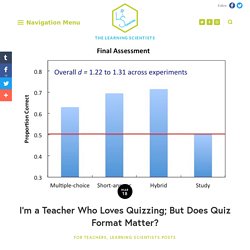
Of course, providing quizzes in class can mean a lot of different things. I (Megan) mentioned that I give my students extra credit quizzes. Here’s what this process looks like in my classes: At the beginning of some lectures (students don’t know which lectures until it happens!) , I put a few questions up on the board and ask my students to write the answers to the questions.
The questions I ask are usually broad and guide the students to describe and explain concepts from a previous lecture. I (Yana) tend to incorporate quizzes into most of my lecture classes. This is all well and good, but we realize that there are some practical barriers to this type of activity in some classrooms. On a short-answer question, the students were given a prompt and had to produce the answer on their own. Is it all just memorisation? Retrieval Practice in the Collaborative Setting. If you’ve read my blog before, you know I’m a big proponent of retrieval practice.
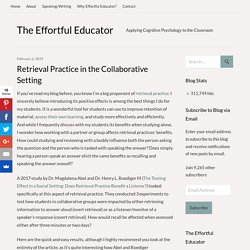
I sincerely believe introducing its positive effects is among the best things I do for my students. It is a wonderful tool for students can use to improve retention of material, assess their own learning, and study more effectively and efficiently. And while I frequently discuss with my students its benefits when studying alone, I wonder how working with a partner or group affects retrieval practices’ benefits.
How could studying and reviewing with a buddy influence both the person asking the question and the person who is tasked with speaking the answer? Does simply hearing a person speak an answer elicit the same benefits as recalling and speaking the answer oneself? A 2017 study by Dr. Here are the quick and easy results, although I highly recommend you look at the entirety of the article, as it’s quite interesting how Abel and Roediger manipulated the variables. Weekly Digest #4: How To Write Good Multiple-Choice Questions — The Learning Scientists. We recently wrote about how we attempt to get our students on board with retrieval practice via classroom quizzing.
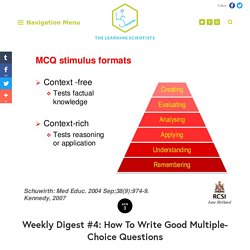
Clearly, this topic is close to our hearts. But if you do a lot of quizzing, the grading starts to mount up. One way to get around this is to use multiple-choice questions, which can be graded quickly and efficiently. The great thing is that research suggests multiple-choice questions are just as good at improving later test performance, which we also blogged about. However, a downside to this is that multiple-choice questions take more work up front to ensure that they are good quality. 1) Writing Good Multiple Choice Test Questions by Cynthia J. A brief article, focusing on just the highlights, including how to construct an effective stem and effective options. Memory not memories – teaching for long term learning. It seems like a life time ago but this time last week I should have been at ResearchEd, listening to great speakers and getting butterflies about my session later that day.
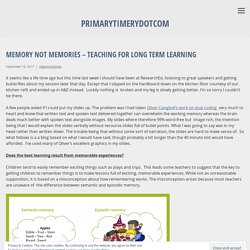
Except that I slipped on the hardboard down on the kitchen floor courtesy of our kitchen refit and ended up in A&E instead. Luckily nothing is broken and my leg is slowly getting better. I’m so sorry I couldn’t be there. A few people asked if I could put my slides up. The problem was I had taken Oliver Caviglioli’s work on dual coding very much to heart and knew that written text and spoken text delivered together can overwhelm the working memory whereas the brain deals much better with spoken text alongside images. Does the best learning result from memorable experiences? Writing A Better Multiple-Choice Question: What Does Research Indicate? The following post summarizes and comments on information contained in the following article: Butler, A.
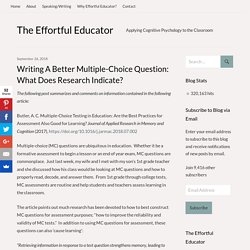
C. Multiple-Choice Testing in Education: Are the Best Practices for Assessment Also Good for Learning? Journal of Applied Research in Memory and Cognition (2017), Multiple-choice (MC) questions are ubiquitous in education. The article points out much research has been devoted to how to best construct MC questions for assessment purposes; “how to improve the reliability and validity of MC tests.” “Retrieving information in response to a test question strengthens memory, leading to better retention of that information over time; it can also change the representation of the information in memory, thereby producing deeper understanding. Assessment as learning: The role of retrieval practice in the classroom. 3.14. 3.13. 3.12. 3.11. CyberCaesar – Learning Latin Online. 3.10. 3.9. 3.8. Plickers. 3.7. 3.6. I'm a Teacher Who Loves Quizzing; But Does Quiz Format Matter? — The Learning Scientists.
3.5. 3.4. 3.3. 3.2. 3.1. Week 3.